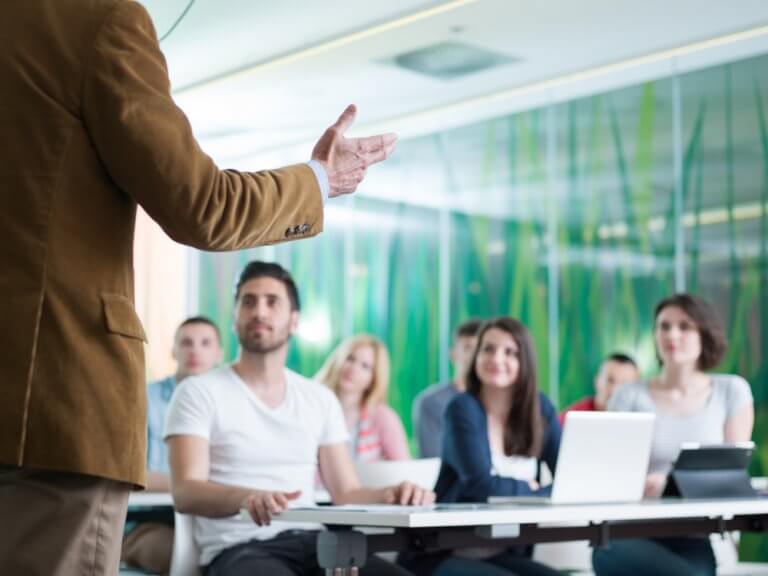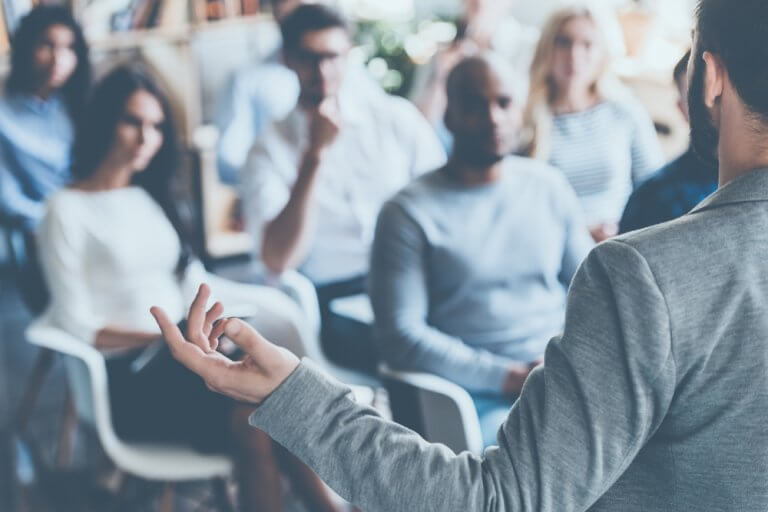Self-Reflection in Education: Important Steps

The application of self-reflection in education is very valuable. The more reflective we are, the more effective we can become.
Self-reflection is the constant use of active thinking. It invites us to detach ourselves from what we consider to be certainties, and to think and debate internally with our more rigid way of thinking.
Self-reflection is a skill that can be developed. The immediate question that arises, then, is: how exactly can we develop it? Let’s focus on three fundamental steps that we can all follow in order to enhance and develop self-reflection in education.
Steps to create habits of self-reflection in education
Pause
The first step in creating habits of self-reflection in education is, of course, to pause – to stop for a moment. Let’s think about the times when we’ve simply fallen headlong into something, and we realize we haven’t even stopped to think about it. It’s something that almost all of us have felt and experienced at some time.

Normally, we just focus on the here and now; we jump from task to task and create to-do lists. We think so much about what to do next that we almost do it without thinking. Without stopping to think. Without stopping at all.
Teachers have so many things to do every day, so many things to finish. But we have to learn to stop for a moment, and to stop ourselves in our tracks. We need to take stock and look at what we’re doing now and why we’re doing it. It’s the first part of the cycle that we have to follow.
Practice
Self-reflection in education should become something that we put into practice. After stopping, then we have to start practicing self-reflection. Here we’ll find several aspects that we need to take into account. There are some key steps within self-reflection after achieving the stop phase.
Awareness
Self-reflection has to create an awareness of the realities of education. It’s a question of knowing the contents of the teaching material, the pedagogic methods, and of course, of knowing our students. We should be aware of all these factors in equal measure at all times.
Intentions
Coincidences in education don’t exist. For that reason, it’s fundamental that everything we do has a specific intention and a plan when it comes to looking for results. We must plan each step in a reflective manner and think about why each step is being carried out.
Evaluation
An educational (or any other) professional who uses self-reflection evaluates the results of their work at all times. This is how they’ll know how effective their efforts and work are each step of the way. When we apply self-reflection to evaluation, then we can discern why some things are working in the teaching-learning process and why others aren’t.
Response
Once we’ve reflected on the evaluation and are aware of whether or not the strategies we’ve put in place have worked, then we can create a response. It’s a matter of modifying what’s really necessary, from knowing how to explain the subject matter to how to answer questions.

Collaboration when creating habits of self-reflection in education
Finally, it’s time to realize that creating habits of self-reflection in education is a very important job, and something that we shouldn’t only do on an individual basis. This is where the need to collaborate arises.
Teachers must talk to each other about the whole process, and about how teaching is changing and broadening its horizons. Everyone should learn to collaborate with everyone around them. It’s a matter of creating a kind of network of self-reflective teachers who can share their experiences with others.
If we want to understand teaching practice in its entirety, then every teaching professional has to be self-reflective and collaborative.
“Teachers must be considered as autonomous and responsible professionals, capable of actively participating in the evaluation of their own teaching function and of the set of components and elements that make up their performance, and, as a consequence of all of this, participating in the improvement of educational quality.”
– Fernandez (2014) –
A teacher, during their career, and when carrying out their work, is always actively learning and experimenting. For that reason, they should never forget to plan and reflect on their own teaching practices.
The application of self-reflection in education is very valuable. The more reflective we are, the more effective we can become.
Self-reflection is the constant use of active thinking. It invites us to detach ourselves from what we consider to be certainties, and to think and debate internally with our more rigid way of thinking.
Self-reflection is a skill that can be developed. The immediate question that arises, then, is: how exactly can we develop it? Let’s focus on three fundamental steps that we can all follow in order to enhance and develop self-reflection in education.
Steps to create habits of self-reflection in education
Pause
The first step in creating habits of self-reflection in education is, of course, to pause – to stop for a moment. Let’s think about the times when we’ve simply fallen headlong into something, and we realize we haven’t even stopped to think about it. It’s something that almost all of us have felt and experienced at some time.

Normally, we just focus on the here and now; we jump from task to task and create to-do lists. We think so much about what to do next that we almost do it without thinking. Without stopping to think. Without stopping at all.
Teachers have so many things to do every day, so many things to finish. But we have to learn to stop for a moment, and to stop ourselves in our tracks. We need to take stock and look at what we’re doing now and why we’re doing it. It’s the first part of the cycle that we have to follow.
Practice
Self-reflection in education should become something that we put into practice. After stopping, then we have to start practicing self-reflection. Here we’ll find several aspects that we need to take into account. There are some key steps within self-reflection after achieving the stop phase.
Awareness
Self-reflection has to create an awareness of the realities of education. It’s a question of knowing the contents of the teaching material, the pedagogic methods, and of course, of knowing our students. We should be aware of all these factors in equal measure at all times.
Intentions
Coincidences in education don’t exist. For that reason, it’s fundamental that everything we do has a specific intention and a plan when it comes to looking for results. We must plan each step in a reflective manner and think about why each step is being carried out.
Evaluation
An educational (or any other) professional who uses self-reflection evaluates the results of their work at all times. This is how they’ll know how effective their efforts and work are each step of the way. When we apply self-reflection to evaluation, then we can discern why some things are working in the teaching-learning process and why others aren’t.
Response
Once we’ve reflected on the evaluation and are aware of whether or not the strategies we’ve put in place have worked, then we can create a response. It’s a matter of modifying what’s really necessary, from knowing how to explain the subject matter to how to answer questions.

Collaboration when creating habits of self-reflection in education
Finally, it’s time to realize that creating habits of self-reflection in education is a very important job, and something that we shouldn’t only do on an individual basis. This is where the need to collaborate arises.
Teachers must talk to each other about the whole process, and about how teaching is changing and broadening its horizons. Everyone should learn to collaborate with everyone around them. It’s a matter of creating a kind of network of self-reflective teachers who can share their experiences with others.
If we want to understand teaching practice in its entirety, then every teaching professional has to be self-reflective and collaborative.
“Teachers must be considered as autonomous and responsible professionals, capable of actively participating in the evaluation of their own teaching function and of the set of components and elements that make up their performance, and, as a consequence of all of this, participating in the improvement of educational quality.”
– Fernandez (2014) –
A teacher, during their career, and when carrying out their work, is always actively learning and experimenting. For that reason, they should never forget to plan and reflect on their own teaching practices.
All cited sources were thoroughly reviewed by our team to ensure their quality, reliability, currency, and validity. The bibliography of this article was considered reliable and of academic or scientific accuracy.
- Arévalo, A., & Núñez, M. (2016). Los profesores hablan. Docencia, 60, 55-65.
- Gavilan-Martin, D., & Martinez-Roig, R. (2020). El pensamiento abierto activo para promover competencias de investigación en los futuros maestros.
- March, A. Fernández. (2004). Portafolio docente, como estrategia formativa y de desarrollo profesional. El Educar 33.
- Mercado, R., & Rockwell, E. (1988). La práctica docente y la formación de maestros. Revista Investigación en la Escuela, 4, 65-78.
This text is provided for informational purposes only and does not replace consultation with a professional. If in doubt, consult your specialist.








